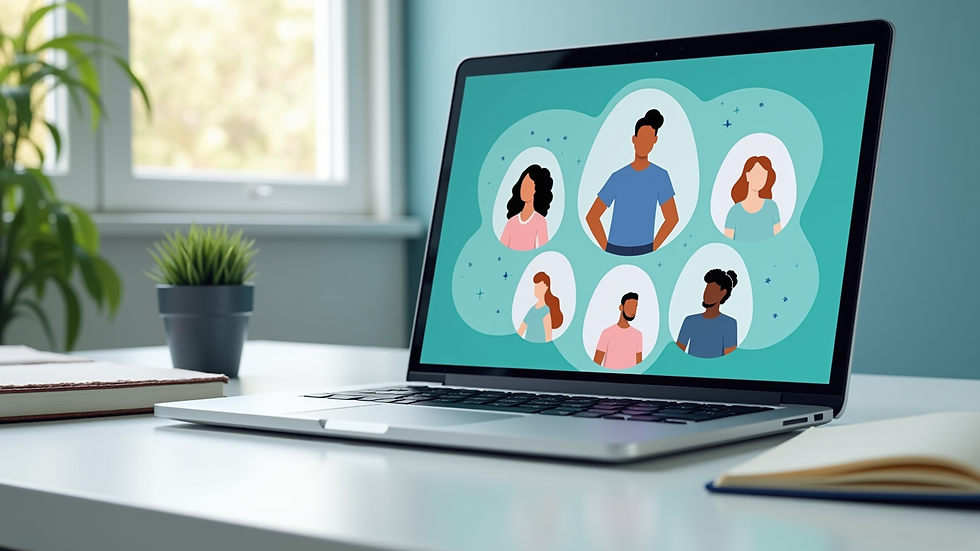The Role of AI in Mental Health Therapy
- James Colley
- Sep 7, 2025
- 4 min read
Updated: Sep 8, 2025
Mental health support is evolving fast. Technology now plays a big role in how people access therapy and care. I want to share how AI for mental health is making therapy more accessible, affordable, and personalized. This change helps many people get the support they need, anytime and anywhere.
How AI for Mental Health is Transforming Therapy
AI is no longer just a buzzword. It’s a tool that helps therapists and individuals in real ways. AI can analyze patterns in speech, text, and behavior to understand emotions and mental states. This helps create personalized therapy plans that fit each person’s unique needs.
For example, AI can track mood changes over time and suggest coping strategies. It can also remind users to practice mindfulness or take breaks when stress levels rise. This kind of support is available 24/7, unlike traditional therapy sessions that happen once a week or less.
AI also helps reduce the stigma around mental health. People can try AI-powered tools privately before deciding to see a therapist. This lowers the barrier to seeking help and encourages early intervention.

Benefits of Using AI in Mental Health Therapy
Using AI in therapy offers many benefits. Here are some key advantages:
Accessibility: AI tools work anytime, anywhere. You don’t need to wait for an appointment or travel to a clinic.
Affordability: AI-powered therapy often costs less than traditional therapy sessions.
Personalization: AI learns from your inputs and adapts to your needs.
Consistency: AI can provide daily check-ins and reminders to keep you on track.
Anonymity: You can use AI tools privately, which helps if you feel shy or worried about judgment.
These benefits make AI a great option for people who want to improve their mental health but face barriers like cost, time, or stigma.
Are there any good AI therapy apps?
Yes, there are several AI therapy apps designed to support mental health. One example is TherappAI, which offers personalized therapy powered by AI. This app helps users track their mood, practice coping skills, and get support anytime they need it.
When choosing an AI therapy app, look for these features:
User-friendly design - The app should be easy to navigate.
Privacy and security - Your data must be protected.
Personalized feedback - The app should adapt to your needs.
Evidence-based techniques - It should use proven therapy methods.
24/7 availability - Support should be accessible whenever you need it.
Using a trusted ai therapy app can be a great first step toward better mental health.

How to Make the Most of AI Therapy Tools
To get the best results from AI therapy tools, follow these tips:
Be honest: Share your true feelings and thoughts with the app.
Use it regularly: Consistency helps the AI learn and support you better.
Combine with other support: Use AI tools alongside traditional therapy or support groups if possible.
Set reminders: Schedule daily check-ins or exercises.
Stay patient: AI therapy is a journey, not a quick fix.
Remember, AI tools are here to support you, not replace human connection. Use them as part of a balanced approach to mental health.
What the Future Holds for AI in Mental Health
The future of AI for mental health looks bright. As technology improves, AI will become even better at understanding emotions and providing personalized care. We can expect more apps and tools that blend AI with human therapists to offer hybrid support.
AI will also help reach underserved communities and people in remote areas. This means more people can get help without worrying about cost or location.
I encourage you to explore AI-powered mental health tools. They offer a new way to take control of your wellbeing and get support when you need it most.

AI is changing mental health therapy for the better. It makes support more accessible, affordable, and personalized. By embracing AI tools like TherappAI, you can take an active role in improving your mental wellbeing. Start small, stay consistent, and watch how technology can help you feel better every day.
Introducing therappai
While many AI therapy apps offer valuable support, therappai sets itself apart with a more holistic and personalized approach to mental health care. Unlike traditional AI chatbots, therappai blends cutting-edge artificial intelligence with evidence-based therapeutic practices, making mental health support both smarter and more effective.
Key Features of therappai
Live AI Video Therapy Sessions — Unlike most AI apps that rely solely on text, therappai offers video-based sessions for more engaging, human-like interaction.
24/7 Therapy via Chat — Need support at odd hours? therappai’s always-on chat function ensures help is available anytime, anywhere.
Daily Mood Tracking & Journaling — Easily log your emotional states and reflections each day, helping you notice patterns and progress over time.
Crisis Buddy Alerts — A built-in safety feature that can alert a trusted contact during moments of crisis, enhancing your peace of mind.
Personalized, Evidence-Based Support — Tailored conversations and coping strategies grounded in proven therapeutic techniques, all designed to fit into your lifestyle.
Progress Insights — Visual dashboards and progress reports help you monitor your mental well-being and celebrate small wins.
Why therappai Is Different
While other AI therapy apps focus primarily on chat-based interactions or single therapy methods, therappai offers a well-rounded toolkit designed to meet you where you are. By combining effective anxiety management tips, stress relief exercises, and personalized growth plans, it empowers you to take control of your mental health in a sustainable way.
If you’re looking for a next-generation solution that balances AI innovation with real human understanding, therappai provides an accessible, affordable, and truly personalized mental health experience.



Comments